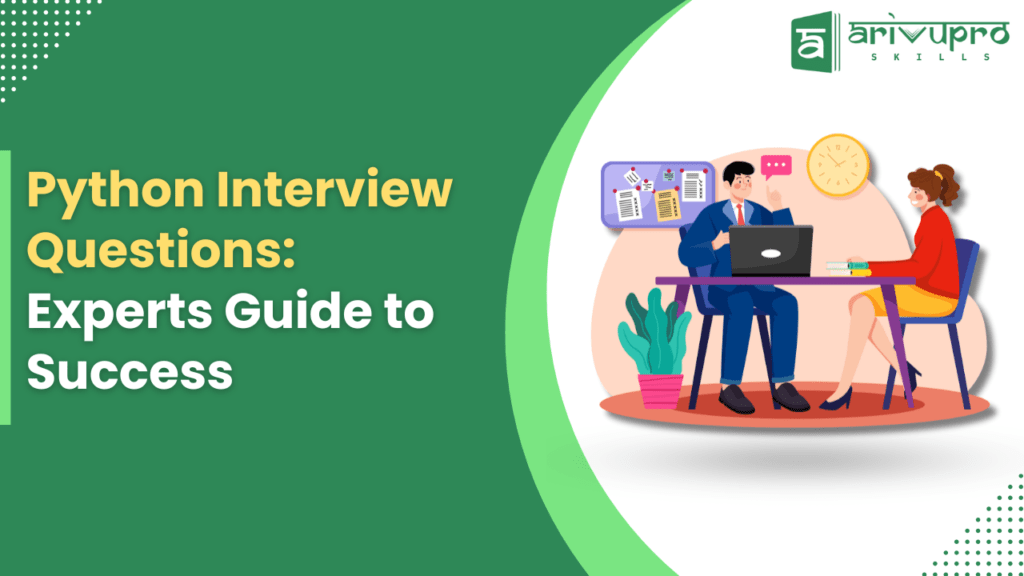Python Interview Questions

Python is one of the most popular programming languages as per current ongoing trends, with applications consisting of web development to data analysis, artificial intelligence, and automated systems. As the need and requirement for Python developers increases, so does the competition for roles that demand Python skills. This makes preparation for Python-related job interviews critical.
In this blog post, we’ll explore and look at some of the most common Python interview questions, divided by different groups such as ability level, while offering insights on what to expect during interviews.
Introduction About Python
Python is very famous for its flexibility and ease of use, making it suitable for both new and experienced developers. However, in a Python interview, you will be required to expect both practical competence and a solid understanding of essential programming ideas.
Python interviews generally analyze your ability of problem solving, as well as your knowledge in data structures, algorithms, programming related to object oriented, and libraries.
Whether you’re fresher or you already have previous experience, preparing for Python-related interview questions will significantly enhance and boost your chances of impressing the interviewer and getting the job you would like.
Categories in Python Interview Questions
- Syntax basics and its concepts
- Object oriented programming
- Structures and algorithms of data
- Framework and libraries
- Coding and Problem solving
Trending Python Interview Questions
Below are few questions which are trending and commonly asked during python interviews:
- What are the features of Python and differentiate it with the other programming languages?
- Differentiate between Python 2.x and Python 3.x?
- How does Python handle and manage the memory?
- Explain Python decorators and how does it work?
- Distinguish between shallow copy and deep copy in the Python?
- Distinguish between “is” and “= =” in Python?
- Explain how to handle the exceptions in Python?
- What is built in data structures in Python and it is useful?
Beginner Level Interview Questions
- What is Python, Explain!
Python is an analysis of the highest level and general purpose programming language. It is known and famous for its clear syntax, which makes it suitable for both new and experienced developers.
- What are the various types of data in Python?
The Python consists of various types of data, including:
Integer numbers = int | Floating point numbers = float | String = str | Ordered and the immutable items collection = tuple | Unordered collection of the unique items = set | Mutable collection of items = list
- Explain the variables concept in Python?
The variables in Python are reserved memory areas for keeping values. In Python, there is no need to explicitly define the type of the variable.
Example,
x = 10 # an integer
name = “aline” # a string
Intermediate Level Interview Questions
- Explain about the built-in functions in Python?
The Python comes with a different types of built-in functions that users can use without importing anything, it includes:
To print the output = print ( ) | To get the object length = len ( ) | To get the object type = type ( ) | To generate the number sequence = range ( )
- Explain about the lambda function in Python?
A lambda function is an anonymous function created as a lambda keyword. It accepts an unlimited number of variables but it consists of only one expression.
Example,
multiply = lambda x, y: y * x
print (multiply(3, 4)) # output: 8
- Explain about the ‘self’ keyword of Python in OOP.
In Python, the ‘self’ keyword is used to refer to the instance of the class. It is passed explicitly towards the methods of the class when they are called and it is utilized to access the variables that are related to the class
Example,
Class Person:
def ___init___ (self, name):
Self, name = name
Def great(self):
Print (f”Hello, the name is {self, name}”)
You may also like: Learn python now!
Advanced Level Interview Questions
- Explain the global interpreter lock in Python and how does it affect the concurrency?
The global interpreter lock is a mutation that avoids the several threads from processing Python bytecodes concurrently. This implies that Python can only run one thread at a time, affecting multi-threading performance, particularly in CPU-intensive jobs.
- Explain the difference between the shallow copy and deep copy in Python?
| Shallow copy | Deep copy |
|---|---|
| It generates the new a new object but does not recursively copy the inner objects | It generates an independent copy of the real object |
| It copies only the references to them | It includes nested objects |
| Use copy ( ) for shallow copies | Use copy.depcopy ( ) for dep copies |
- How do the Python generators work?
A generator is a function that returns a continuous collection of things, one by one, in the form of an iterator. They are generated with the keyword called yield, enabling the function to continue where it has been stopped and left off.
Conclusion
The Python interviews might be challenging, but with proper preparation, you can approach them confidently. Understanding the fundamental ideas, from basic syntax to advanced functions like decorators and management of memory, will help you be well-prepared.
Keeping in mind that Python interviewers usually like your problem-solving methodology and coding style. Make sure you practice more about the coding issues and grasp the fundamental concepts well. A healthy balance of theory and practical coding will help you succeed. Suggestion is to join a Python course online now to leverage your skills and abilities in Python and it will make you ready to face the competitive future.
FAQ’s
Mainly concentrate on learning Python’s fundamental concepts, including data types, control flow, functions, and object-oriented programming.
Mainly Concentrate on researching advanced Python subjects and practice coding tasks more fluently. And also cover up all the major concepts and features about Python.

